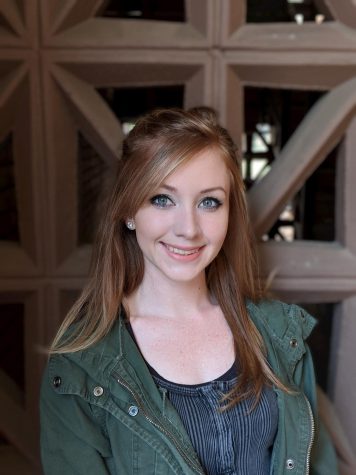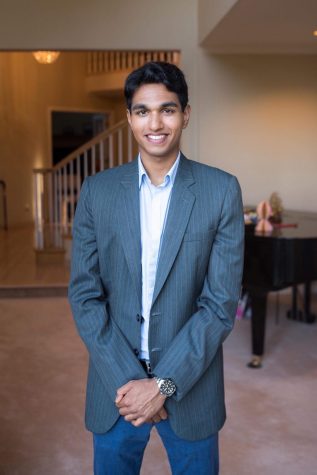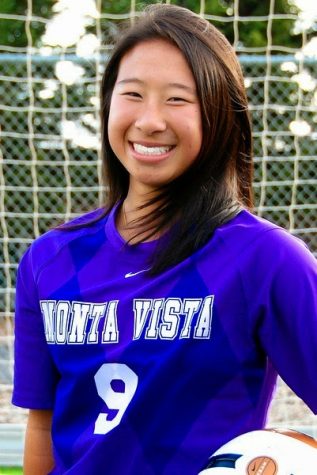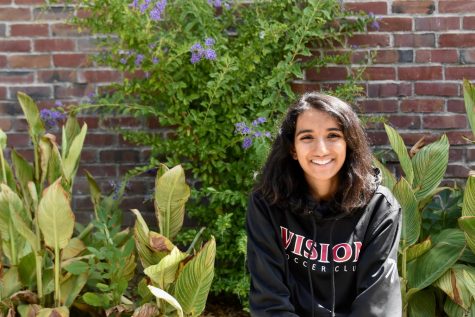Looking back: 3 MVHS reflect on their HS experience
Three MVHS alumni reflect on their high school experience, how it has affected their lives and what they wished they had done differently
Ameya Mahajan, MVHS graduating class of 2013, enjoyed classical guitar, was on the swim team, participated in Spanish National Honor Society, Triathlete Music Society, Science National Honor Society and worked as a lifeguard in the summers. Mahajan graduated from Yale with a double major in statistics and economics. After a successful internship at JP Morgan the summer after junior year, Mahajan moved to New York to accept a full-time job at JP Morgan on Wall Street, where he is currently working.
Hayley Chan, class of 2011, had a high school experience enriched by activities like soccer, Ohana and robotics. Chan followed her time at MVHS by attending Purdue University, aiming to become a doctor. She got her bachelor’s degree in biology, and is currently at Boston University, working on her master’s thesis. Concurrently, she is applying for medical school.
Melissa Piling, class of 2013, spent her last two years of high school at MVHS after moving from St. Francis High School (SFHS). Her time at MVHS was devoted to her academic classes, field hockey, softball and spending time with her friends. After graduating, Piling attended Sonoma State as a molecular biology major. Currently, Piling is receiving her masters at San Jose State University, where she works in a lab trying to cure hemophilia A.
All of these MVHS alumni were involved in various activities in high school. They had different passions, interests and paths in life. Regardless of where they are today, five to seven years ago they all walked down the halls of MVHS.
Common Likes and Dislikes
Although their high school experiences were drastically different, Mahajan, Chan and Piling all appreciated one thing about MVHS: the teachers.
“It’s easy to take your teachers for granted,” Mahajan said. “But remember that all over the country there are public high schools everywhere where the teachers don’t give a f—k. They clock in and they clock out, but they’re not really involved in the activities . The fact that there are adults, who are not your family, not your friends, who are like your mentors and actually care to a significant degree about your academic and personal development is really cool.”

As a junior moving from SFHS to MVHS, Piling noticed a big change in the sense of community. She was extremely close to her friends at MVHS, so much so that she felt like she had a family at school, which created an educational environment that allowed her to flourish.
“You were allowed to express yourself however you wanted. [Your peers] accepted who you are as a person.When I went to St. Francis, there was a lot of pressure to wear designer clothing, you had to have Ugg boots or a Juicy jacket, and if didn’t have those things you weren’t cool. But at MVHS, it didn’t matter if you had material things.
Although Mahajan agrees that from national standards MVHS is a diverse place, he directly contradicts Piling, stating that the type of thinking at MVHS was essentially the same.
“The problem with [MVHS], and specifically our part of [the Bay Area], is that it can be very homogenous at times,” Mahajan said. “Group thinking is very prominent. Once that group consensus starts to form, everyone feels obligated to buy into that consensus, and agree with it for the sake of agreeing. There wasn’t a lot of controversial discussion. Disagreeing about stuff … was not very predominant, and it was almost looked upon in a negative way. But I think it’s great for progress to disagree on stuff.”
Chan also claims this group mentality created a large amount of stress for students by creating standards that were often unrealistic and unhealthy.
“Back at MVHS, I was pretty stressed out,” Chan said. “I [was] really worried, I was a little too picky and I guess too stressed on being perfect [at] everything… and I really don’t look back fondly on how, if this is still a thing, how people would brag about how little sleep they got.”
Adjusting to college
After moving to college, Chan, Mahajan and Piling all had to adapt to college life. Some aspects of college were similar to MVHS, while others drastically differed. And just as middle schoolers adjust to high school, all incoming freshmen must adjust to college.
“Purdue was pretty similar to MVHS in terms of the vigor and the demand of the academic environment,” Chan said. “But what I did not expect was the social and the geographical environment … People are super laid back, super nice. It was a culture shock but in a really good way because it helped me gain a different perspective and not be so on edge whenever I am interacting with people.”
Encouraged by her experience from Purdue, Chan eventually began to examine and change a lot of the stressful habits she had picked up from her time at MVHS.
“I met a lot of different people who basically helped me step out of my comfort zone and relax as a person,” Chan said.
Piling, on the other hand, stayed comparatively close to home. Relative to her classmates, Piling thought her college classes were easy and excelled as a student. The adjustment for Piling was her change in majors.
“Ironically, I really struggled with science like chemistry and biology when I was in high school,” Piling said. “I really excelled in classes like history and English … but it wasn’t until I got to college when the sciences kind of clicked for me.”
After deciding not to become a nurse, Piling joined multiple labs. She realized she loved the planning, surprise, understanding and excitement that came with biological research, switching her major to molecular biology.
“It’s a big puzzle,” Piling said. “Every day there are new challenges and obstacles you have to troubleshoot and brainstorm. So I really like that aspect of things, I like the logic that goes into it.”

Although she admits a sizeable change like switching majors can be difficult, Piling used college as a time to discover and later pursue a field that she truly appreciates.
“As a doctor, you can help hundreds of people in your career,” Piling said. “But when you’re in research, if you can invent a novel therapeutic or a new drug you can impact lives of millions, and really make a huge difference in society. So I think that is a big driving force or a big motivator for me.”
Mahajan also switched majors in college. Although he went to Yale as a biology major, he realized after just one biology class that it wasn’t for him. He quickly switched majors to applied math with a concentration in statistics, eventually double majoring in math and economics. However, unlike both Chan and Piling, his adjustment to Yale was anything but simple.
“It was really brutal,” Mahajan said. “My freshmen fall was my worst semester there in terms of grades because the adjustment was really, really steep … The style of learning and exercise was a lot more creative problem-solving and a lot less about the volume of problems you can produce in a certain period of time.”
Mahajan felt that MVHS homework was often very repetitive and required little application or critical thinking skills. But in his classes at Yale, Mahajan had a smaller set of problems assigned, five questions for a week for example. Mahajan says this method forced students to pick up on tricks and apply techniques to problems in ways not shown in class. And although he acknowledges this way of teaching is much harder than the methods used in high school, he highly recommends it.
“In college, they’re trying to train people to solve problems of the future,” Mahajan said. “So at the end of the day… it’s much harder because there’s less guidance, there’s less examples, you kind of have to figure it out and struggle. But that’s the kind of approach that’s valuable when you’re trying to arm people to work on the problems of the future.”
Effects on the future
Although all three alumni really enjoyed their college experience and were able to find a family away from home, the transition to college is by no means a small one, according to Mahajan. All three alumni also agree that their time at MVHS played an instrumental role in how they approached this transition and their success in college.
For example, due to the diversity MVHS, Piling was able to learn how to deal with people from different backgrounds, greatly helping her communication skills. To a certain extent, she also claims that MVHS’ competitive and intense environment, often seen as a negative, provided her an advantage in college by better preparing and her teaching her how to study and take notes.
Chan agrees that MVHS helped her develop a strong work ethic. Especially during her first year at Purdue, the competitiveness of MVHS carried through and enabled her to stay on top of everything, creating a smoother transition in the long run. When things get rough, she used her high school experiences to help her push through.
“I think deep down it definitely contributes to my work ethic,” Chan said “Tying into the whole Purdue making me laid back and less on edge, that has become kind of the dominant character trait for me. But then if I really am challenged to have more responsibilities, or the academic rigor of being in a graduate program, [my MVHS work ethic], that’s my other gear that I turn on. So it’s definitely there and it does help me in that way.”
Although Mahajan agrees that MVHS helped him achieve success in college, he disagrees as to why. To him, the sheer difficulty of MVHS, in terms of academic standards, was hugely beneficial, while the competitive environment contributed nothing. Even though transitioning to Yale was difficult, Mahajan explains that this adjustment is difficult regardless of what high school the students came from around the country. Although everyone struggled, his experience at MVHS ultimately enabled Mahajan to persevere past that failure.
“What MVHS gave me, among other things, was a willingness and stubbornness that you just go at something and try to figure it out and not give up,” Mahajan said. “[Even] if it takes hours and hours and hours and hours … sometimes you have to throw yourself into it so that it becomes easier with time. I think MVHS really gave me that much: that energy, that determination to take that approach.”
Looking back and Advice
Regardless of the ups and downs at MVHS, high school was a memorable experience for Chan, Mahajan and Piling and a major factor in the rest of their future.
Chan recalls one particular memory that sticks out to her from high school: the specific instant she realized her high school career was over.

“It was the night after or the morning after Senior All Night Party,” Chan said. “I just remember the sun rising after that night and I’m just like ‘woah, high school is over. That’s it, now it’s the real world, onto bigger and better things.’ The reality [hit] me; [I] am going on to the next step of my life. It was weird and scary.”
Mahajan explains that nearly all MVHS students have dozens of both good and bad memories at MVHS, but at the end of the day, it is a truly special school.
“It’s bittersweet,” Mahajan said. “There’s really tough and s—-y parts about [MVHS], and there [are] really great parts about it, but that’s what makes the experience what it is.”
Chan, Mahajan and Piling all agree on one piece of advice: students should not caught up in the perceived stressful and competitive environment at MVHS. They should focus on their well-being and remember to put things into perspective. Furthermore, each alumni encourages high school students to reach out and explore what truly interests them, even if it’s not a commonly accepted passion.
“The advice I would give is that you naturally become most successful at stuff you enjoy doing,” Mahajan said. “It doesn’t really matter what it is —it matters that you care about it and you pursue it relentlessly because you’re passionate about it.”
Piling acknowledges that this can be difficult, especially in a place like MVHS where it feels like there are very few “right” paths. Still, she encourages students not to get caught up in what others say, but rather stay true to what makes them happy and allows them to express their individuality. Chan supports this idea.
“I think the biggest thing [I would do differently] would be having my own opinion about things,” Chan said. “Just because I feel like I got really caught up in the competitive atmosphere of MV. I didn’t really think about what I wanted versus what everybody else was going along with. I felt like if I could do it over I would tell myself to take a moment to think about what I was getting into … instead of jumping and just because everybody else is.”
Piling encourages students to follow their dreams no matter, but stay open to dreams and goals changing several times.
“Find someone that’s doing what you want to be doing,” Piling says, “And then try to figure out how they did it. Try to talk to them reach out. Work for it as hard as you want it. I think a lot of people have these big dreams, right? But you can’t imagine all your dreams are going to come true if you’re not working towards them.”


